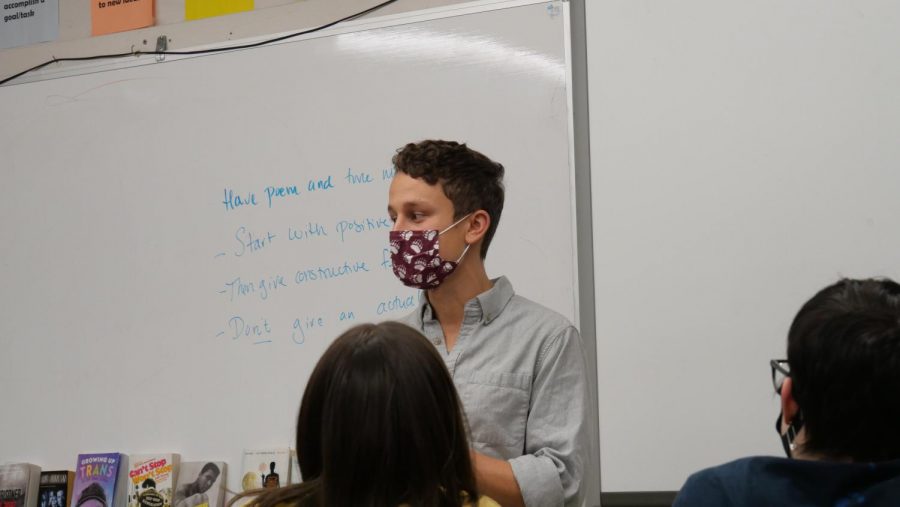Special Guest: Samuel Boudreau (’15) Visits to Help with Poetry Out Loud
December 10, 2021
Larissa Hebert, an English teacher at Bellows Free Academy, recently gave her English classes the opportunity to work with Sam Boudreau (‘15) on a lesson in poetry recitation. In 2014 and 2015, Boudreau was named the Vermont Poetry Out Loud state champion and represented Vermont in the national competition. According to Hebert, Poetry Out Loud is a national recitation contest that begins at the classroom level.
Boudreau made time to come and speak to a few classes about poetry, and to aid in some small lessons about poetry recitation with students. This helped students prepare for the class competition. BFA’s school Poetry Out Loud competition will take place Feb. 3 at 6 p.m. in the Performing Arts Center.
Spread out amongst some of Nate Archambault’s, Susan Palmer’s and Larissa Hebert’s classes, BFA will be sending 12 students to the school competition; the winner of this competition will move onto the state competition, Hebert said.
In an effort to prepare students for their class competition, Hebert’s students have been working over the past few weeks selecting their poems, mapping their tones and beginning to work on memorization and recitation.
Today, The Mercury got the opportunity to sit in on Hebert’s AP Language and Composition class during Boudreau’s lesson.
“I love working with students on poems and poetry. It’s always one of the highlights of my year when Mrs. Hebert asks me to come in and work with students,” Boudreau said.
Boudreau began the lesson by reciting his own poem, “100 Love Sonnets 17,” by Pablo Neruda, translated by Robert Bly. Afterward, he asked students what they thought he did well while reciting.
According to students, his tone, pace and the emotion in his voice helped draw them into his presentation, which Boudreau says are all important aspects of a poetry recitation to help convey the poem’s message.
“Every poem has a purpose in the world, and the way you recite will leave an audience with a feeling…that’s the point of a poem, to leave an audience wanting more, but also giving them a gift,” Boudreau said.
Boudreau used this as a lead-in to some other advice for students regarding presentation, mainly surrounding their pronunciation. Points are taken away in the competition for mispronouncing titles and authors, as well as pronouncing ‘Vermont’ without the ‘t’, Boudreau explained.
Students were also given the opportunity to split into their own individual groups to work on their poetry recitations. Boudreau and Hebert were both present to offer support and feedback during this exercise, but it was primarily student lead.
“It’s interesting to see everyone bring their unique twist on poems,” Asher Ballantine (‘23) said. “There was a great sense of authenticity [with it].”
Students also noted that, while reading their poems to their classmates was a bit nerve-wracking, it was important to get used to the feeling. Despite the nerves, each group was extremely supportive of each other while presenting and offered constructive feedback and compliments afterward.
“It was very warm, and fun and accepting. It was a good opportunity,” Emily Farrell (‘23) said.
According to Hebert, Sam Boudreau’s visit was a success.
“I think the students are supportive of each other and are definitely taking that first risk, standing up and reciting their poems for each other,” said Hebert. “It’s always interesting to have students participate in this because it’s different from the norm. They can surprise themselves.”


Louise May Thompson • Dec 14, 2021 at 6:31 pm
What a beautifully written article! The students, the teacher, Mrs. Hebert, and Sam Boudreau, the presenter, all contributed their thoughts and ideas on poetry. This made for a rich,interesting article. Thanks.